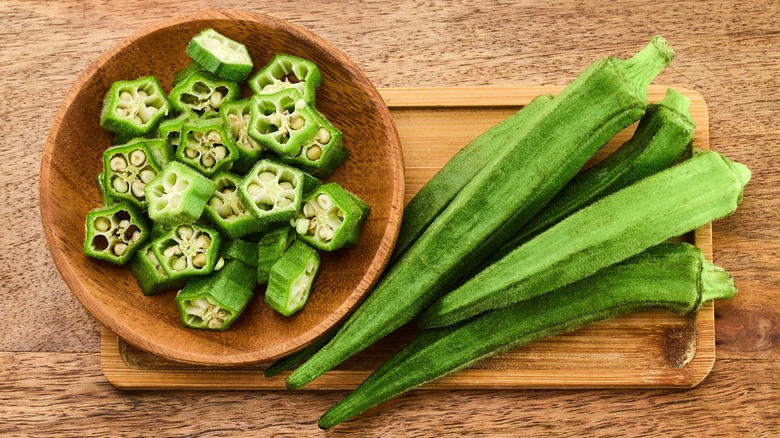The States That Produce The Most Okra In The US
Okra is a somewhat polarizing vegetable. Some people love to hate on it for its apparent sliminess (which can be avoided with an easy okra pickling trick), but millions of Americans (myself included) adore consuming okra in all its wonderful forms. Whether it's fried, pickled, or cooked in a flavor-packed gumbo, this versatile veggie is a beloved staple across the American South. Many Southerners grow their own okra in home vegetable gardens, but it's also cultivated as a cash crop across the United States. Whether you firmly believe every refrigerator needs a jar of pickled okra in it or you avoid it at all costs, the importance of okra as an American crop is undeniable.
The United States produces more than 10,000 tons of okra annually on roughly 15,000 acres of farmland. Okra thrives in tropical and warm, temperate conditions. It's particularly valued for its ability to keep producing through long, hot summers. As such, it's no surprise that okra cultivation in the United States is centered in some of the warmest states — Florida, Texas, Georgia, and California.
The history of okra in the United States
In addition to being a homegrown crop, the United States is also one of the top okra-importing countries; proving that despite okra's status as one of the most controversial foods in the United States, Americans love eating this seedy vegetable. Although its exact origins are disputed, okra is probably native to Africa. From there, it was brought stateside between the 1500s and 1700s. Over the last few centuries, okra has become an essential ingredient in culinary traditions across the South and, in particular, a key element of Gullah cuisine, one of the most impactful influences on Southern food.
Globally, okra is a staple ingredient in South Asian cuisines as well. India is the world's top okra producer, growing a whopping 6.5 million tons of the seedy vegetable annually. Although the United States only makes up a small fraction of total global okra production, okra has a long history stateside and is an important crop for many smaller American farmers. No matter how you feel about okra, its culinary and cultural impact in the United States is undeniable.

